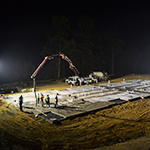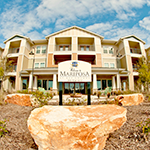
Whether it’s reimagining existing hotels or building new ones, Minneapolis-based Wischermann Partners, Inc. starts by analyzing what kind of hotel an area or property needs to see the biggest return, and then it works with its investors and franchise partners to make each of its projects a reality. The ability to carefully select and secure the correct brand is one of the company’s hard-earned luxuries. Through its 11-year tenure garnering a portfolio that includes more than 7,000 hotel rooms, Wischermann has gained the trust of such renowned global brands as The Luxury Collection, W, Westin, Sheraton, Le Méridien, Marriott, Renaissance, Hilton, Courtyard, aloft, Element, and Four Points. “You don’t just get started working with brands,” says Shaun O’Laughlin, vice president of development and construction. “You have to build industry relationships before you can build hotels.” By establishing its reputation, Wischermann has not only racked up construction and hotel-operations excellence; it has also gained the trust to work closely with franchising companies, ensuring that the scope of each of its projects accommodates the aspirations of each partnering brand, testing the envelope, and delivering quality to local markets for situational success.

“While asset quality and value offerings are very important in determining guest satisfaction, exemplary service and the human touch are what bring guests back time and time again,” O’Laughlin says. ”Our vision is to create truly memorable guest experiences through an operating culture of warmth, caring, passion, and excellence, executed by the best and brightest in the industry. Our executives lead from experience and always by example. The team represents a collection of industry veterans with diverse backgrounds, offering experience with luxury and upper-upscale hotels, resorts, boutique hotels, conference centers, and select-service hotels.” The company particularly enjoys working on existing assets and renovations in markets where it might not be feasible to build something new. “The key to [renovation projects] is to create value by significantly changing the experience,” O’Laughlin says. By instituting bold change, the company is able to shift public perception of properties, creating interest and turning the renovated hotels into market leaders that will drive an increase in room rates. Two of Wischermann’s recent projects, one in Minneapolis and the other in the Chicagoland area, exemplify its strategic approach.

The Courtyard by Marriott Minneapolis Downtown Hotel is a $16.5 million rebranded and fully renovated hotel featuring Courtyard’s newest look. The hotel has 265 redone guest rooms, a reimagined two-story lobby and check-in area, a new bistro bar, a theater, and even a market. Additionally, the prefunction rooms, meeting rooms, a 5,000-square-foot ballroom, a fitness area, and a pool have all been redone. The investor that brought Wischermann on to this project had never done a hotel; the firm’s services were sought out as a result of its reputation. The Le Méridien Chicago Oakbrook Center project is a $21.4 million renovation of a hotel originally built in the early 1970s at the Oakbrook Center Mall. Wischermann had known that the previous hotel on the lot was closing, so it actually brought the idea of rehabbing the property to its investors to get the green light. The hotel required all-new curtain-wall window glazing to replace its obsolete single-pane windows. The new exterior takes cues from classic Chicago architecture, with a window pattern modeled after those of Mies Van der Rohe’s famous skyscrapers. Inside, Wischermann incorporated ideas of fashion and pattern into the hotel’s look, with primary colors contrasting with black-and-white textures and materials both in the 172 refinished guestrooms and in the first-floor “Hub,” which joins the lobby, the check-in area, and a transitional bar. The hotel’s public meeting areas are located on the top floor, including a new ballroom, a new boardroom, the Club Concierge Room, and the Sky Bar.

Most companies in the hotel industry fall into one of two lines of work: project development or hospitality management. Wischermann makes both its business. The integrated approach allows the company to take ownership of hotel operations and the formation of a business plan after construction is complete. Renovation has to take place quickly so that a Wischermann property can earn a new average rate as soon as possible. The timeline for the Courtyard project involved four months of planning to solidify the brand and finish the designs, and the construction phase took about eight months, resulting in a 12-month project life cycle. Wischermann’s initial rate increases typically start at about $10 per room, but in Chicago and Minneapolis, the company expects to see $30–$50 rate increases. This will put Wischermann 20–40 percent above its competition in the two cities. “Each … of our hotels is striving for positioning in the top 10 percentile in guest satisfaction within its peer groups,” O’Laughlin says. It’s clear that goal is well within reach.


